 |
|
 |
| |
This page was established in April 1999 to carry
brief details of newly completed sundials. If you would like to
suggest an entry for such a sundial, please send an Email to info@sundials.co.uk
with " New sundial (for posting)" in the subject line. Please be
sure to read the details for these arrangements at the
foot of this page |
|
 |
|
 |
 |
|
 |
| |
A new dial near Sheffield

|
This new dial by Harriet James
is at Worrall near Sheffield and is carved in Bretton Moor
- a local stone. The gnomon is made of bronze as is the
Equation of Time graph which is by the front door. The house
had a forge which was used by outworkers in the Sheffield
cutlery trade.>
|
|
|
 |
|
 |
 |
|
 |
| |
West Park, Long Eaton, Derbyshire

|
The West Park sundial in Long
Eaton was built by the Friends of West Park (with the assistance
of the Erewash Borough Council). Their
website provdes a very detailed description of the design
and construction process, which would be useful and interesting
to any other groups carrying out a similar project |
|
|
 |
|
 |
 |
|
 |
| |
Equatorial dial in Teruel, N.E. Spain
The equatorial sundial of wood
and stainless steel was erected in 2009 at the Posada El
Cadoncho in the village of Calomarde.
The Hour lines and numbers are perforated in the equatorial
ring. The time is read on the centre post from the sunlightr
projected there through the perforations. The accuracy is
claimed to be to the nearest minute. The dial also gives
readings for the dates, solstices, equinoxes, and zodiac
times. Materials: stainless steel and quality wood. |
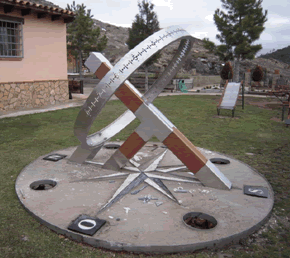
|
|
|
 |
|
 |
 |
|
 |
| |
Green's Windmill, Nottingham

|
This dial was made for the science
centre at Green's
Windmill, Nottingham, former home of the mathematician
and physicist George Green (1793-1841) who worked as a miller.
The dial was commissioned by the George Green Memorial Fund
in memory of their former Secretary and biographer of George
Green, Mary Cannell The trustees wanted an 'interactive'
sundial as the museum is visited by school parties. The
dial is read by swinging the gnomon round until its pointer
is directed at the sun and its shadow disappears. The time
is read off on the band of hours round the globe. The dial
was made by Harriet
James and was installed in 2006. It is carved in Portland
stone. The sphere has a diameter of 300mm. |
|
|
 |
|
 |
 |
|
 |
| |
Utah Valley State College, Heber City, Utah

 |
Sun Dagger was created by sculptor
Robert Perless for the Wasatch Campus of Utah Valley State
College off Route 40 in Heber City, Utah. It functions as
a unique celestial observatory, and amplifies the union
and synergy of man and nature. It is a polar-pointing gnomon
horizontal sundial, which also works as a noon transit sundial,
and as a seasonal calendar, celebrating the winter and summer
solstices and the vernal and autumnal equinoxes with rainbows
crossing the sun line. The gnomon of the sundial faces True
North and is elevated at an angle of 40.46 degrees, the
latitude of Heber City. At solar noon, when the sun crosses
the meridian, the ray of sunlight coming through the slit
in the gnomon illuminates the 12 o’clock position. ......more
|
|
|
 |
|
 |
 |
|
 |
| |
London Wetlands Centre, Barnes, London
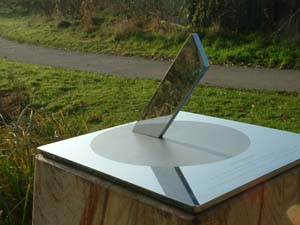
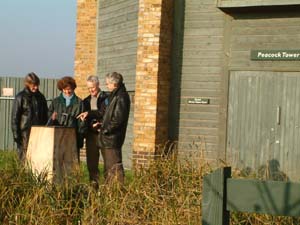
|
This Spot-On
sundial is a memorial to a noted
environmentalist who was associated with Peter Scott
who founded the Wildlife and Wetlands Trust.
The mirror-polished stainless steel gives strong reflections,
and the gnomon, which casts the shadow, appears to "float
in air" because the matt circle appears to be continuous
though part of it is in fact a reflection.
For about 5 minutes at solar noon, when the sun is at its
highest in the sky, a line of light shines through the slit
in the gnomon. This design feature is used to orient the
sundial exactly to true North so that it can be read to
the narest minute or two ....more
|
|
|
 |
|
 |
 |
|
 |
| |
Sundial in Bitola, Macedonia

|
This sundial is located on the
town square in the city of Bitola.
It was designed by Aleksandar Shulevski of the Astronomical
society of Bitola. The dimensions of the dial are 12 by
5 meters, and the declination of the wall is 9 degrees to
the east.
The sundial is positioned on the central city square. This
project was undertaken as a part of the reconstruction of
the old central part of the city in which structures from
the 19 - th century are prevalent.
The sundial is of a vertical design, with the wall declining
to the east for an angle just short of 10 degrees. The dimensions
are a bit unusual - 12 by 5 meters, but overall, the dial
adds beauty to the surroundings, and is just right. Due
to the large size, the time can be read off to a distance
of about 30 mete
|
|
|
 |
|
 |
 |
|
 |
| |
Treloars College, Hampshire, England

|
A new sundial at Treloars College,
Hampshire in memory of two pupils. Two declination curves
mark their birthdays. The dial is carved in Portland stone,
painted and gilded with gold and platinum leaf. The gnomon
is of stainless steel with a gold-plated sphere 'nodus'.
The dial was made by Harriet
James in 2003. |
|
|
 |
|
 |
 |
|
 |
| |
A new sundial in Porirua, New Zealand
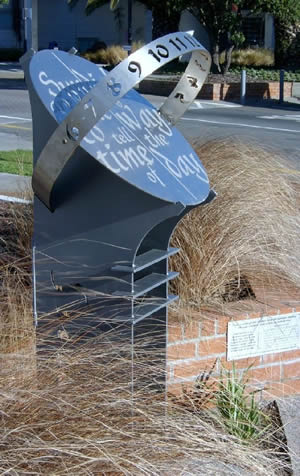
|
The sundial was designed by Andrew
Gray and manufactured by A E Tilleys Ltd and John Kinviq
Engineering and installed by Gavin Dench.
Location - Corner of Parumoana and Norrie Street, Porirua
CBD |
|
|
 |
|
 |
 |
|
 |
| |
A new sundial in Turin
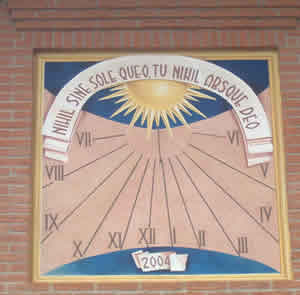
|
This sundial was commissioned
by Angelo Grasso and is at Via Pervinche 32, Turin, whic
is part of the "Two Queens Estate" and owned by the Grasso
family. . It is 1.5 metres square and was designed by Barbara
Voarino and Mario Tebenghi.
It is one of the few sundials in Turin and one of the largest.
Particular consideration was given to the motto and, in
the end, a religious sentence was chosen to helpipeople
passing under it. The Latin translates as "None of us can
do anything without God's help". |
|
|
 |
|
 |
 |
|
 |
| |
A new dial in Wiltshire

|
This new cube dial at Crockerton,
Wiltshire was made for the owner's birthday by Harriet
James . A 'v' nodus tracks a declination curve for the
day on the east and west faces. The dial is carved in Portland
stone and painted. The gnomons are made of brass. |
|
|
 |
|
 |
 |
|
 |
| |
The floral sundial at Easton Lodge


|
Daisy, Countess of Warwick, laid
out a small private garden at Easton Lodge near Great Dunmow
in Essex,probably around 1865. It contained a floral sundial
surrounded by hour lines made of planted box, and an inscription,
also in box. There is a photograph of the Victorian sundial
>in all its glory in " " available to visitors to the gardens.
The present owners of Easton Lodge, Brian and Diana Creasey,
have spnt many years of effort in recreating and adding
to the magnificent gardens of Easton Lodge, which fell into
complete decay during and after the last war. For the Millennium
project, they decided to recreate the floral sundial. The
British Sundial Society was approached, and the then Secretary,
David Young, with other society members calculated the angles
of the hour lines and laid out the lmeridian line so the
sundial would point accurately to true North. Now. two years
later, the yew is growing up well within the metal framework
of the gnomon, and the box hedges are also growing well.
In only a few more years, the sundial will be the equal
of the equal of its predecessor. (Our thanks to Nicolina
who kindly posed to give scale to the sundial) There is
an extensive website describing the gardens
of Easton Lodge which are open to the public , at present
on Fridays, Saturdays and Sundays only Consult the website
for location, opening times, etc. |
|
|
 |
|
 |
 |
|
 |
| |
West Overton dial restoration

|
The Victorian sundial at the
church of St. Michael and All Angels, West Overton, Wiltshire
restored by Harriet
James in 2003.
The dial was correctly delineated by its original makers
to face 38° east of south. The fine cast bronze gnomon had
fallen off but had been kept by the church wardens. It had
originally been made to an incorrect angle and had been
set into a slot in the stone to compensate. For the restoration
the gnomon was reengineered and new clamps were made to
fix it to the stone. The carved stone surface of the dial
was cleaned and some small weathered patches were repaired.
The carved detail was painted to make it readable from the
ground as the dial is more than 50 feet up the tower of
the church. |
|
|
 |
|
 |
 |
|
 |
| |
The Millennium Timespace at Gosport
 The
focal point for the waterfront promenade is a unique public
time piece and performance space named the 'Timespace'.
In celebration of the year 2000 the design draws a physical
and spiritual ink between Holy Trinity Church and Portsmouth
Harbour. The birth of Christ and the start of the measurement
of modern time is symbolised by the line leading from the
Timespace to the church and the year 2000 by a line leading
from the space to the Harbour. The
focal point for the waterfront promenade is a unique public
time piece and performance space named the 'Timespace'.
In celebration of the year 2000 the design draws a physical
and spiritual ink between Holy Trinity Church and Portsmouth
Harbour. The birth of Christ and the start of the measurement
of modern time is symbolised by the line leading from the
Timespace to the church and the year 2000 by a line leading
from the space to the Harbour.
The design takes as inspiration Albert Einstein's theory
of relativity and his space-time cone diagram is represented
within the paving. At the central 'here and now point' is
a mast which casts the shadow for the sundial. The shadow
of the cones fixed through the mast marks the sun time.
When the sun crosses the meridian, the line of true north
marked on the paving surface, a small circle of light through
the cones indicates not only the time but also the date.
The entrance to the timespace from the Millennium Promenade
is via a sculptural millennium gateway of 9m clear span
steel work infilled with blue toughened glass. The gateway
houses a digital clock linked to LED coloured lighting within
the paving surface which marks the hours, five minute and
five second intervals. The clock is linked to an acoustic
system built into the lower seating terrace which enables
the clock to chime. The gateway also houses a remote PA
system fitted with an induction loop for hearing aid users,
a CD and tape player.
The surfacing of the timespace consists of textured coloured
concrete carefully chosen to associate with the coloured
mosaics on the two adjacent landmark tower blocks, Harbour
and Seaward Towers and a new mosaic around the perimeter
of the space between the symbolic date lines depicts events
and characters through Gosport's history over the past 2000
years.
The tower block mosaics, central mast and millennium gateway
are illuminated at night providing a dramatic backdrop for
the harbour, visible from Portsmouth and out into the Solent.
|
|
|
 |
|
 |
 |
|
 |
| |
The Leicester "Eye of Time"
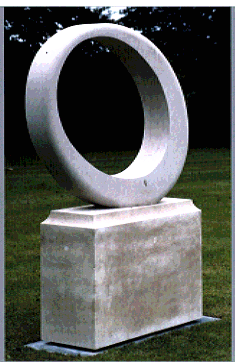 Crafted in fine Portland Stone or marble in various sizes
by English master stonemasons, the " " Analemma is a beautiful
landscape feature that blends dramatic design with fascinating
functionality. Sundial designed by Professor Allan Mills.
Crafted in fine Portland Stone or marble in various sizes
by English master stonemasons, the " " Analemma is a beautiful
landscape feature that blends dramatic design with fascinating
functionality. Sundial designed by Professor Allan Mills.
This sculptural " " incorporates a small hole angled upwards
in a north-south plane. At midday (or 1 BST) the Sun shines
through it to project a spot of light upon a figure-8 shaped
curve (known as an analemma) incised on the inner surface
of the work. The time of year is indicated by the position
of the pot around this curve. |
|
|
 |
|
 |
 |
|
 |
| |
The Amble Dial
 Due to be finished by the end of March and formally opened
on 27th May 2001 is the Town Centre Development at Amble,
Northumberland. An impressive and imaginative development,
this conversion of a former car park provides a garden,
a curved trail with marker plaques, peripheral seating,
a small 50 seat amphitheatre and a large horizontal sundial.
The dial is 12 m in diameter and has a stainless steel gnomon
over 7 metres high. It has been commissioned by the Amble
Development Trust with Northumberland County Council. Dial
delineation and consultancy is by Patrick Powers. The dial
may be viewed at: http://ourworld.compuserve.com/homepages/patrick_powers/amble.htm
Due to be finished by the end of March and formally opened
on 27th May 2001 is the Town Centre Development at Amble,
Northumberland. An impressive and imaginative development,
this conversion of a former car park provides a garden,
a curved trail with marker plaques, peripheral seating,
a small 50 seat amphitheatre and a large horizontal sundial.
The dial is 12 m in diameter and has a stainless steel gnomon
over 7 metres high. It has been commissioned by the Amble
Development Trust with Northumberland County Council. Dial
delineation and consultancy is by Patrick Powers. The dial
may be viewed at: http://ourworld.compuserve.com/homepages/patrick_powers/amble.htm
|
|
|
 |
|
 |
 |
|
 |
| |
Tagg's Island, Hampton Court
 
This unique sundial designed specifically for Taggs Island
consists of 13 fins, a hemispherer and rings which represent
the tropics of Capricorn and Cancer, and two polar circles.
The dial has been made for the exact latitide and ligitude
of Taggs Island by David Harber
Sundials |
|
|
 |
|
 |
 |
|
 |
| |
Hinckley Sundials
Hinckley and Bosworth Borough Council last year commissioned 2 new
sundials for Hinckley in Leicestershire from ornamental blacksmiths
Ray Jones and Son.
The Millennium Galaxy sundial is of contempory design and is dominated
by a central image of the world surrounded by the planets of the
solar system (and even the odd satelite!) It is sited in the beautiful
surroundings of Hollycroft Park in Hinckley. It has to be seen to
be believed!!)
The second sundial(The Childrens Sundial) is located in the tranquil
surroundings of The Rock Gardens in Hinckley and contains images
drawn by local school children.This is a more traditional 4 sided
structure. (The council currently does not have a website to enable
pictures to be posted) For more information contact Hinckley and
Bosworth Borough Council , Leisure Services Department, Argents
Mead , Hinckley , Leicestershire LE10 1BZ telephone 01455 238141 |
|
 |
|
 |
 |
|
 |
| |
Ship sundial
The sun dial was designed and constructed by Gardner Malloy for
a Millennium project for Cockenzie harbour near Edinburgh. The reclining
dial has an nautical theme of a boat and wave. Posted by willier33@hotmail.com
(William Robertson) |
|
 |
|
 |
 |
|
 |
| |
Solar energy Research Center, Rehovat, Israel
Zipora Gendler is an Israeli sculptor and in 1988 was commissioned
to create a sculpture for the SOLAR ENERGY RESEARCH CENTER at the
WEITZMAN INSTITUTE OF SCIENCE in Rehovot, Israel. A sundial was
the first idea that came into my mind and tried to read as much
as possible on the subject, and of course got hooked up with this
fascinating subject. Though not as new as the others on this
page, this sundial was not previously known to us and we hope will
interest you. |
|
 |
|
 |
 |
|
 |
| |
Hemingborough Millennium dial
The dial was erected on Saturday July 15th 2000, and was accepted
by Michael Hickes on behalf of the village on Sunday July 16th at
a small ceremony and blessing.
The dial is of wooden construction, painted and varnished with a
scrolled wrought iron gnomon. The wall declines by 1.5º E; but the
dial is angled to face due South and tells Local Apparent Time.
Designed and crafted by Phillip Wishart and Sarah Edmondson-Jones.
Visit web.libertysurf.co.uk/azimuth
for pictures. |
|
 |
|
 |
 |
|
 |
| |
La Meridiana
Currently under construction on a hill near Rome is a sundial which
is also the stair tower of a house "La Meridiana". It is being built
in celebration of the Millennium by its owner and designer Mark
Lennox-Boyd. From dawn sunlight shines through a small opening in
the east wall, is later in the middle of the day reflected off a
mirror placed on the south window sill, and later still passes through
a hole in the west wall until sunset. It has in all 20 dials which
tell Time, Date, Zodiac, Altitude, Azimuth, and the Times of sunrise
and sunset. For more details visit www.solartime.co.uk.
(posted 6 June 2000) |
|
 |
|
 |
 |
|
 |
| |
New sundial in Putney, London

|
The Putney Society decided, at the end of
1998, to erect a sundial as our contribution to marking the
Millennium. We were fortunate to obtain permission to put
up a vertical strip dial on the south face of Zeeta House
at the junction of Putney High Street and the Upper Richmond
Road. We wanted a design which would reflect our commitment
to improving the environment, to echo our swan logo and to
reflect the importance of the river to Putney
The base plate of our sundial is the swan, the gnomon (the
shadow casting rod) is in the form of an oar, and the we hope
that the design of the sundial proves an enhancement to the
local environment. The dial is made of brass, which will gradually
oxidise and become darker, making the sundial more prominent.
Our designer, David Harber, suggested that we add a motto
as these are traditional and uplifting features associated
with sundials, which were often seen as oracles as well as
timepieces. You will see that the motto is "Time like an ever
rolling stream" which has echoes of the motto on the sundial
on the tower of St Mary's Church at the other end of the High
Street.
Posted 17 January 2000 |
|
|
 |
|
 |
 |
|
 |
| |
Sundial to be presented to the Horniman Museum,
London

|
The Wenger Sundial uses a glass globe with
the outline of the continents of the world scribed by laser.
The user's location is at the top of the globe. The user places
a pointer (finger or pencil) on the globe moving the pointer
until the shadow of the tip falls upon the center of the globe.
Nearby time lines (analemmas) are used to read the time of
day. Following the current position of the sun parallel to
the Equator to the local horizon line the user may read the
time and direction of sunrise and sunset. Designed by Daniel
Wenger
Posted 17 January 2000 |
|
|
 |
|
 |
 |
|
 |
| |
South Wraxall, Wiltshire, UK

|
A new dial at South Wraxall, Wiltshire, UK
made by Harriet James. Carved in green slate with painted
and gilded decoration, this dial declines 55° west of south.
The layout of hour lines is divided about the thickness of
the gnomon and the time is told from the leading edge of the
gnomon. The dial reads local time. The motto translates as
'Better late than never'.
Posted 11 January 2000 |
|
|
 |
|
 |
 |
|
 |
| |
Museum of the Royal Engineers, Chatham, England

|
On 19th November 1999, a polar sundial was
presented to the Corps of Royal Engineers of the British Army
by the Worshiplful Company of Tylers and Bricklayers, one
of the ancient livery companies of the City of London. The
picture shows the sundial being unveiled by Lieutenant General
Sir Scott Grant KCB, Chief Royal Engineer, and Sir Idris Pearce
CBE TD DL, Master of the Worshipful Company of Tylers and
Bricklayers. This polar sundial is mounted on a plinth of
exactly 2000 brickss. It was designed by Piers
Nicholson. There are two other sundials of a similar design
have been built at Greenwich and at Blackfriars (see below).
|
Posted 30 November 1999 |
|
 |
|
 |
 |
|
 |
| |
The Millennium Village, Greenwich, England

|
On 29th November 1999, a polar sundial was
presented to English Partnerships, the urban regeneration
agency which owns the Greenwich Peninsula by the Worshiplful
Company of Tylers and Bricklayers, one of the ancient livery
companies of the City of London. The picture shows the sundial
being unveiled by Nick Raynsford, the MP for Greenwich and
Minister for Construction.. |
A closer view of the sundial with the designer,
Piers Nicholson, (on the left) and the Minister for Construction,
Nick Raynsford.
It was raining for this opening too! |

|
Posted 11 December 1999 |
|
 |
|
 |
 |
|
 |
| |
Pauls Walk, Blackfriars, London
(30 m. upstream from the new Millennium footbridge)
The pictures show the sundial outside the
City of London Boys School, and the view downstream to Southwark
Bridge (before the Millennium footbridge was built)
 
|
Posted 19 December 1999
|
|
 |
|
 |
 |
|
 |
| |
New College, Oxford, England
This new vertical decliner has been made in the summer of 1999 at
New College, Oxford. It measures 15'x 17' and is placed high above
the college quadrangle on the medieval Muniment Tower. The design
is based on records of earlier dials in the same position which
existed from the late 17th C. for about 200 years.

|
The background of the dial is painted white.
The Roman numerals, hour lines, MM for 2000 and WW for William
of Wyckham, founder of the College, are all carved directly
into the tower. The hour lines an noon cross are gilded, the
numerals are painted blue.
The gnomon is 13ft long made of 1" stainless hollow tube,
painted black with supporting stainless scrollwork and a pair
of braces with a pair of stainless yacht cables to give extra
stability. The dial declines 10° W of South. It tells Local
Apparent Time. The gnomon was aligned with the help of a laser
trigon mounted on the gnomon bar. This was made by Dr. John
Davis.
The dial was designed, carved and delineated by Harriet
James. It was commissioned by the Warden and Scholars
of New College with funds provided by Professor E.T.Hall.
FBA.
Posted 11 October 1999 |
|
|
 |
|
 |
 |
|
 |
| |
Durham University, England
The new vertical declining dial (2° 45' East) at St, Mary's College,
University of Durham Elvet Hill Road, Durham City, DH1 3LR is on
the south face of the college main building facing a private lawn.
The dial, which is intended as a memorial to a deceased staff member,
was set in place on 24th June 1999 when a 'time capsule' was placed
in an existing cavity behind it. A framed parchment giving reading
instructions and a 365 day correction table incorporating longitudinal
correction is to be placed in the porch under the dial. Sundial
enthusiasts who enquire at the college office are welcome to view.
The bronze frame, designed to harmomise with the building's architecture,
was cast in Scotland from a wooden pattern. The phosphor-bronze
dial plate (Pb 102) was set out and hour lines and roman numerals
milled in the workshops of Lindisfarne
Sundials in Bedlington, Northumberland.
Posted 25 July 1999 |
|
 |
|
 |
 |
|
 |
| |
New sundial at Ashby, Suffolk
| The new sundial
at Ashby was commissioned by one of the parishoners, and
designed and carved by Harriet
James. It was dedicated in March 1999. The sundial is
of Portland Stone, with the hour lines formed by carved arrows
flying to the centre. The hour is indicated when the shadow
is exactly over the shaft of the arrow, the half-hours when
the gap between the arrow heads is centrally in the shadow,
and the quarter hours when the shadow is on the edge of the
flight. |

|
| posted 15 April
1999 |
|
|
 |
|
 |
 |
|
 |
| |
We very much welcome details of forthcoming sundials
for this page. Postings for this page may be of up to 100 words.
They should include a link to a picture of the site of the sundial,
located on your own personal web space or some other web site. (There
is no space for them on "Sundials on the Internet". Postings should
include the name of the designer and the name of the person or organisation
commissioning the sundial. The name of the designer can be linked
to their entry on the "Sunfair" page if
they have one. Postings will be maintained for 4 months; you must
undertake not to move any of the linked images during this time.
The exact wording you want should be sent in the body of an Email
to info@sundials.co.uk
with "New sundials (for posting)" in the subject line. |
|
 |
|
 |
|

